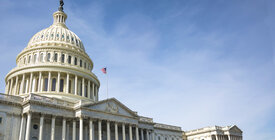
Speaker Johnson Denies Being an Election Denier
The speaker of the House refuses to accept an important Supreme Court ruling.

Part of
You’re reading The Briefing, Michael Waldman’s weekly newsletter. Click here to receive it in your inbox.
In an interview over the weekend, Speaker of the House Mike Johnson again insisted that he’s not an election denier. Then . . . he falsely claimed the 2020 election was illegitimate.
Johnson takes pains to distinguish himself from people like Rep. Marjorie Taylor Greene (R-GA), who insists that widespread voter fraud decided the 2020 election. To that rough claim he applies a legalistic-sounding varnish. Amid the frenzy of theories about rigged voting machines, Italian spy satellites, and mysterious boxes of ballots, he engineered a more civilized-sounding reason to block the election results. The problem, he insisted, was that state officials violated the Constitution by expanding absentee voting, offering mail ballots, and making other changes in response to the Covid-19 pandemic. In the real world, this heroic effort by election officials of both parties led to a smooth and secure election, handling the highest voter turnout since 1900. To Johnson, these moves were illegal and undermined the integrity of the election.
This is an empty distinction. Johnson and Greene both believe the 2020 election was stolen — their only disagreement is who stole it. Johnson is an election denier with horn-rimmed glasses and a law degree.
In his interview on CBS’s Face the Nation last weekend, Johnson repeated his claim that “what happened in many states by changing the election laws without ratification by the state legislatures is a violation of the Constitution. . . . That’s a plain fact that no one can dispute.”
In fact, the Supreme Court repudiated this very claim last June. Johnson’s theory was reflected in what became known as the “independent state legislature theory.” That’s the claim that the Constitution gave state legislatures sole authority to set federal election rules with no checks and balances from state courts, constitutions, governors, or voters — and that nobody had noticed it until now.
Johnson’s notion was nonsense. No court had ever found it in two centuries, and it was not how elections were run anywhere in the country. In Moore v. Harper, Chief Justice John Roberts and Trump appointees Brett Kavanaugh and Amy Coney Barrett joined the liberal justices. Johnson’s “theory” was wrong previously, and it is even more wrong today. Now that is a “plain fact that no one can dispute.”
Were Johnson making his case before a court of law, he could be sanctioned for failing to acknowledge legal authority contrary to his own position. Politicians, on the other hand, are free to say silly stuff. But he is more than a pundit hungering for airtime or clicks. Johnson is second in line to the presidency and could play an important role in any congressional consideration of the outcome of the 2024 presidential election.
These days, journalists puzzle over how to cover Donald Trump, whose speeches and social media posts veer increasingly toward out-and-out authoritarianism. Ignore him? Or cover him? It’s time to ask the same question about Mike Johnson. Now he wields enormous power. What would he do this time? I hope he’ll be asked, again and again, why he remains an election denier — his denials notwithstanding.
More from the Federal Attacks on the Freedom to Vote collection
-
Brennan Center Responds to Myths about Noncitizens Voting in Federal Elections
Former president Donald Trump and Speaker of the House Mike Johnson make false claims about noncitizens voting and propose unnecessary bill to prevent it. -
House Republicans Threaten DC Home Rule
President Biden’s budget and recent remarks from several Republicans in the House underscore how tenuous DC’s limited right to self-government is. -
Project 2025’s Anti-Voter Agenda
The conservative policy plan aims to abuse a 150-year-old law to target political enemies and undermine voting rights and elections.


